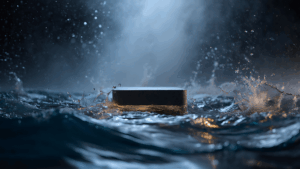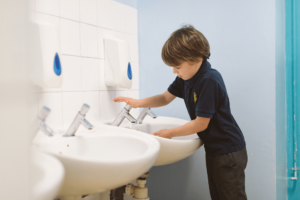What are nanoplastics?
As you’d expect, nanoplastics are tiny. A nanoparticle is classified as anything between one and 1,000 nanometres in size. To give you a better indication of this, 1,000 nanometres is equal to one hundredth of a millimetre. Minuscule and invisible to the human eye. Nanoplastics in the water have become a big problem and have been found in all stages of the food chain, including in human organs and tissues.
Scientists have discovered we ingest around 2,000 pieces of nanoplastic a week (in total about the weight of a credit card). Shockingly, some of this comes from your own cuppa – the majority of tea bags are not only sealed using plastics, they also have nanoplastics incorporated into them because they help keep the bags rigid in hot water… which is why they’re not compostable. So if you’re worried about the amount of nanoplastics you may have in your own body, the first action to take is to change your brand of tea bags to a plastic-free one!
What is the water industry doing about nanoplastics in the UK’s water supply?
In 2019, UK Water Industry Research published Sink to River – River to Tap, a review of the potential risks of nanoplastics and nanoparticles. Researchers found that while microplastics are found in our water supply, water treatment plants are dealing with them very effectively. “This project has confirmed the efficacy of both water and wastewater treatment processes in the removal of microplastic particles from raw water and wastewater leading to very low levels in the final products, i.e. potable water and final effluent. … >99.99% of microplastic particles are removed through the treatment processes, with raw water having an average of 4.9 microplastic particles/litre and potable water having on average 0.00011 microplastic particles/litre.”
Removing plastic waste from the UK’s water supply
Clearly, the way to ensure that water companies don’t need to work so hard to remove nanoplastics from our drinking water is to not have any kind of plastic in the water at all. There are now a number of projects, groups and individuals around the world working on new and innovative ways of harvesting plastics from oceans, seas and rivers. These include global initiatives such as the Ocean Cleanup which aims to clear 90% of the plastic waste in our oceans and rivers, government initiatives to ban single-use plastics, initiatives by local businesses such as the café owner swapping free drinks for buckets of beach litter collected, and even individuals who pick litter by themselves just because they want to make a difference.
Unfortunately, since the pandemic, nanoplastics in the water have become an even bigger problem because of the number of disposable face masks that have made their way into our waterways. With China alone producing two hundred million masks a day, it’s no wonder so many people are so worried about their impact on the environment. It shows we still have a long way to go.
What can my business and I do about nanoplatics in UK water?
Each year, 4 million tonnes of plastic pollution is washed down drains and into rivers from UK businesses and households. Unblocktober is a month-long campaign that promotes ways we can all change our habits for the better. Even small changes to your business water habits can make a big difference. These changes will also help to improve your business drainage systems and help prevent flooding.



